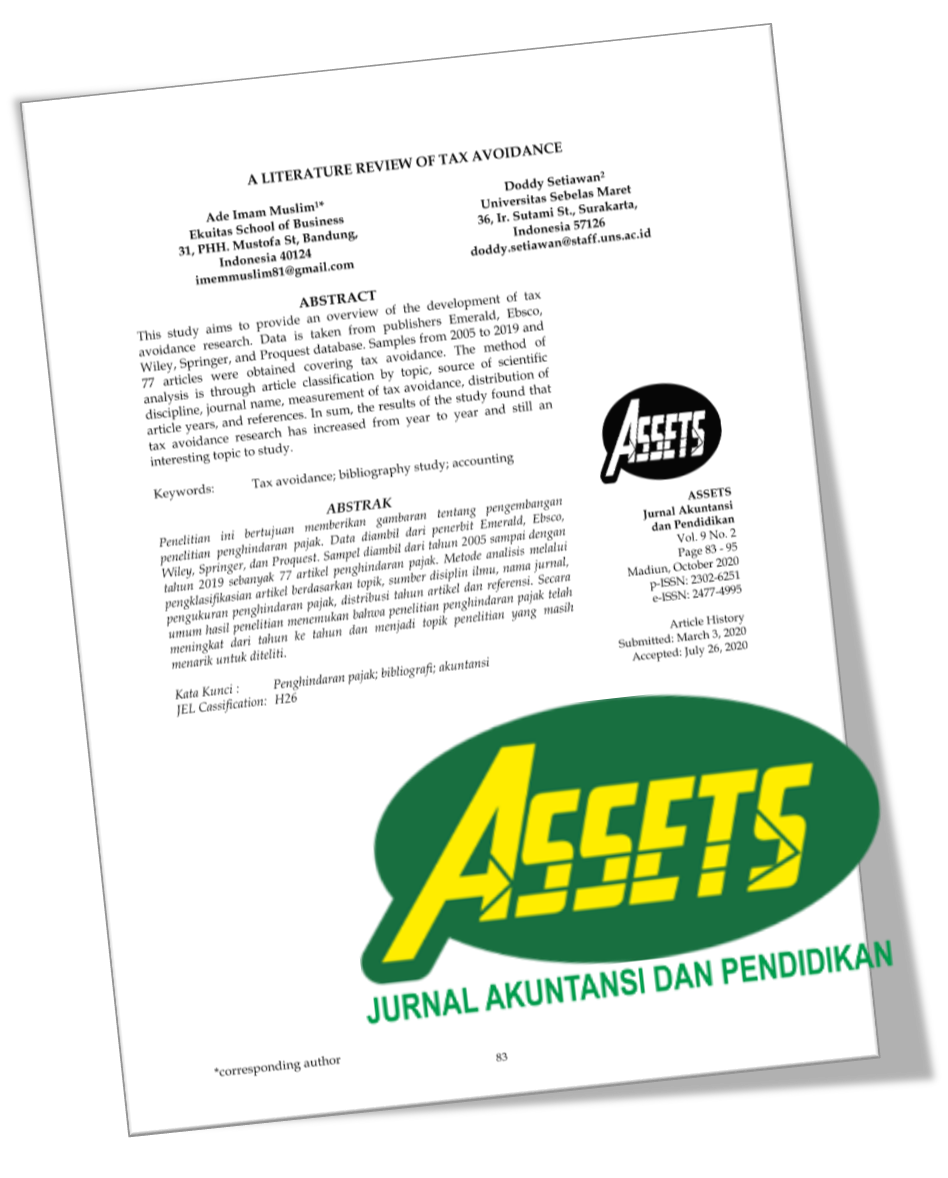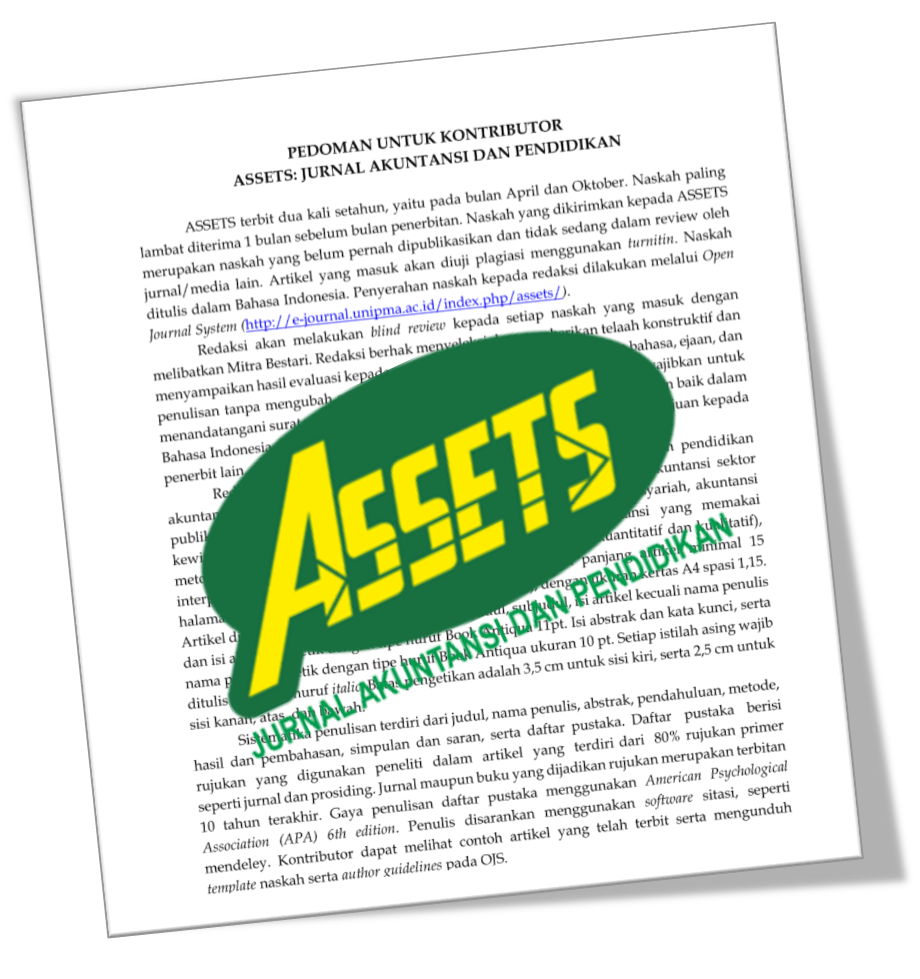DETERMINATION OF ACCOUNTABILITY FOR LIQUIDITY OF DEBT IN THE RAMBU SOLO’
DOI:
https://doi.org/10.25273/jap.v12i2.12399Keywords:
Love Accountability, Socio-Cultural Accountability, Akuntabilitas Cinta, Akuntabilitas Sosial Budaya, Akuntabilitas Fisik, Likuiditas, Hutang Rambu Solo’Physical Accountability, Liquidity, Rambu Solo’ Debt,Abstract
ABSTRACT
This study aims to examine and analyze the determination of accountability on the liquidity of rambu solo’ debt. The research population is members of the Toraja community who live in Palu City. Samples were taken purposively, and 150 people of Toraja lived in Palu City. Who are get in Perhimpunan Masyarakat Toraja Indonesia (PMTI). Data were obtained through questionnaires that were distributed directly to respondents. The results showed that determining loving-kindness and socio-cultural accountability affected debt liquidity in the rambu solo’ culture. In contrast, physical accountability did not affect debt liquidity in the rambu solo’ culture.
ABSTRAK
Penelitian ini bertujuan untuk menguji dan menganalisis penentuan akuntabilitas likuiditas utang rambu solo’. Populasi penelitian adalah anggota masyarakat Toraja yang berdomisili di Kota Palu. Sampel diambil secara purposif sebanyak 150 orang masyarakat Toraja yang tinggal di kota Palu. Yang tergabung dalam Perhimpunan Masyarakat Toraja Indonesia (PMTI). Data diperoleh melalui kuesioner yang dibagikan langsung kepada responden. Hasil penelitian menunjukkan bahwa penentuan akuntabilitas cinta kasih dan akuntabilitas sosial budaya berpengaruh terhadap likuiditas utang pada budaya rambu solo’, sedangkan akuntabilitas fisik tidak berpengaruh terhadap likuiditas utang pada budaya rambu solo’.
Downloads
References
Aithal, P. S. (2021). Business Excellence through the Theory of Accountability. International Journal of Case Studies in Business, IT, and Education, May(May), 88–115. https://doi.org/10.47992/ijcsbe.2581.6942.0103
Din, M., Munawarah, M., Ghozali, I., Achmad, T., & Karim, F. (2022). Governance of Financial Management and Regulation-Based Fiscal Accountability. Journal of Governance and Regulation, 11(2), 116–123. https://doi.org/10.22495/jgrv11i2art10
Hamdani. (2016). Good Corporate Governance: Tinjauan Etika dalam Praktik Bisnis. Mitra Wacana Media.
Heineck, G. (2017). Love thy neighbor – religion and prosociality. International Journal of Social Economics, 44(7), 869–883. https://doi.org/10.1108/IJSE-09-2015-0258
Ikatan Akuntan Indonesia. (2018). Standar Akuntansi Keuangan (K. D. S. A. K. I. A. Indonesia (ed.); 2018th ed.). Ikatan Akuntan Indonesia.
Indriasari, R., Totanan, C., Made, N., Parwati, S., Mayapada, A. G., & Pakawaru, M. I. (2022). Basic environmental accountability in the yadnya ceremony in Malakosa Village, Indonesia. AMCA JOURNAL OF COMMUNITY DEVELOPMENT, 2(1), 1–6. https://doi.org/10.51773/ajcd.v2i1.89
Jensen, M. C., & Mekling, W. H. (1976). Theory of The Firm: Managerial Behavior, Agency Costs and Ownership Structure.
Jossa, B. (2021). Liquidity Preference Theory or Loanable Funds Theory. Archives of Business Research, 9(8), 87–91. https://doi.org/10.14738/abr.98.10544
Keay, A. (2017). Stewardship theory: Is board accountability necessary? International Journal of Law and Management, 59(6), 1292–1314. https://doi.org/10.1108/IJLMA-11-2016-0118
LAN dan BPKP. (1999). Akuntabilitas dan Good Corporate Governance. LAN dan BPKP.
Murakami, H. (2022). Keynesian and classical theories: static and dynamic perspectives. Evolutionary and Institutional Economics Review, 19(1), 343–367. https://doi.org/10.1007/s40844-021-00205-5
Nurmandi, A., Agustiyara, A., & Purnomo, E. P. (2020). What Factors Affect Financial Transparency Reports? A Study of Regional Government Financial Reports in South Sulawesi Province, Indonesia. International Journal of Economics and Business Administration, VIII(Issue 4), 525–544. https://doi.org/10.35808/ijeba/604
Panggabean, J. S. E. A., & Hariwibowo, I. N. (2021). Keterbukaan Budaya Lokal Dalam Akuntabilitas Keuangan Gereja Kristen. Jurnal Akuntansi Multiparadigma, 12(3), 601–619. https://doi.org/10.21776/ub.jamal.2021.12.3.34
Paranoan, S. (2015). Akuntabilitas Dalam Upacara Adat Pemakaman. Jurnal Akuntansi Multiparadigma, 6(2), 175–340.
Peng, L., Wang, Q., & Zhou, D. (2022). Social Networks, Trading, and Liquidity. In SSRN Electronic Journal (p. 31). SSRN Product and Services; Elsevier. https://doi.org/10.2139/ssrn.4099114
Pidhegso, Achmad Yugo Huda, F. N., Fadli, S. D., & Darma, T. S. (2020). Akuntabilitas Pengelolaan Keuangan Negara: Studi Kasus Empat Tahun Anggaran (2015-2018) Laporan Keuangan Pemerintah Pusat (F. N. Pidhegso, Achmad Yugo Huda & S. D. Fadli (eds.); 1st ed.). Pusat Kajian Akuntabilitas Keuangan Negara.
Pilon, M., & Brouard, F. (2022). Accountability Theory in Nonprofit Research: Using Governance Theories to Categorize Dichotomies. VOLUNTAS: International Journal of Voluntary and Nonprofit Organizations, April 2022. https://doi.org/10.1007/s11266-022-00482-7
Rahakbuw, P. J., & Firdausy, S. (2018). AKUNTABILITAS: MENUJU INDONESIA BERKINERJA. Deputian Reformasi Birokrasi: Kementerian PAN Dan Birokrasi Reformasi. http://rbkunwas.menpan.go.id/artikel/artikel-rbkunwas/426-akuntabilitas-menuju-indonesia-berkinerja
Randa, F. (2016). REKONSTRUKSI KONSEP AKUNTABILITAS ORGANISASI GEREJA DALAM KERANGKA NILAI-NILAI BUDAYA LOKAL. In F. Randa (Ed.), Akuntabilitas Organisasi Nonpemerintah (pp. 1–18). Universitas Duta Wacana. https://www.academia.edu/10355138/REKONSTRUKSI_KONSEP_AKUNTABILITAS_ORGANISASI_GEREJA_DALAM_KERANGKA_NILAI_NILAI_BUDAYA_LOKAL_Sebuah_Kajian_Etnografi_Kritis_Inkulturatif_
Shalchian, H., M’Zali, B., & Tebini, H. (2018). A Multi-Dimensional Analysis of Corporate Social Responsibility: The Liquidity Risk Factor. Journal of Financial Risk Management, 07(03), 241–253. https://doi.org/10.4236/jfrm.2018.73016
Subramanyan, K. R. (2017). Financial Statement Analysis (11th ed.). McGraw-Hill Asia.
Sugiyono. (2018). Metode Penelitian Kuantitatif, Kualitatif dan R&D. Alfabeta.
Suwanda, D. (2015). Factors Affecting Quality of Local Government Financial Statements to Get Unqualified Opinion (WTP) of Audit Board of the Republic of Indonesia (BPK). Research Journal of Finance and Accounting, 6(4), 139–157.
Totanan, C. (2012). Debt And Credit Principle in Culture Toraja Ethnic Rambu Solo': A New Perspective Non-Contractual. IOSR Journal of Business and Management, 4(3), 26–31.
Totanan, C. (2021). Semiotika Utang Dalam Budaya Rambu Solo’ Masyarakat Toraja: Akuntansinya Di Mana (D. Kusumaningsih & Supriatnoko (eds.); 1st ed.). Bildung.
Yamin, N. Y. (2022). Pendekatan Akuntabilitas Kinerja Sektor Publik. In S. S. Sharon (Ed.), Bunga Rampai Akuntabilitas Kinerja Sektor Publik (1st ed., pp. 117–134). Media Sains Indonesia. https://drive.google.com/drive/folders/1l_bsTKDUWKa-KKfuYgtXZzDAEE5Q73Jx?usp=sharing
Downloads
Published
Issue
Section
License
Perjanjian Lisensi dan Hak Cipta
Saat mengirimkan naskah ke jurnal, penulis menyatakan bahwa:
- Mereka diberi wewenang oleh rekan penulisnya untuk masuk ke dalam perjanjian ini.
- Karya yang dimaksud belum pernah diterbitkan secara resmi sebelumnya, kecuali dalam bentuk abstrak atau sebagai bagian dari kuliah, resensi, tesis, atau overlay jurnal yang diterbitkan.
- Karya yang dimaksud tidak sedang dipertimbangkan untuk diterbitkan di tempat lain,
- Publikasi karya yang dimaksud telah disetujui oleh semua penulis dan oleh otoritas yang bertanggung jawab - secara tahu sama tahu atau eksplisit - dari lembaga tempat pekerjaan itu dilakukan.
- Mereka mengamankan hak untuk mereproduksi materi apa pun yang telah diterbitkan atau dilindungi hak cipta di tempat lain.
- Mereka menyetujui lisensi dan perjanjian hak cipta berikut.
Hak Cipta
Penulis yang menerbitkan dengan ASSETS: Jurnal Akuntansi dan Pendidikan menyetujui persyaratan berikut:
- Penulis mempertahankan hak cipta dan memberikan jurnal hak publikasi pertama dengan karya yang secara bersamaan dilisensikan di bawah Lisensi Atribusi Creative Commons (CC BY-SA 4.0) yang memungkinkan orang lain untuk berbagi karya dengan pengakuan kepenulisan karya dan publikasi awal di jurnal ini.
- Penulis dapat masuk ke dalam pengaturan kontrak tambahan yang terpisah untuk distribusi non-eksklusif dari versi jurnal yang diterbitkan dari karya tersebut (misalnya, mempostingnya ke repositori institusional atau menerbitkannya dalam sebuah buku), dengan pengakuan publikasi awalnya di jurnal ini.
- Penulis diizinkan dan didorong untuk memposting karya mereka secara daring (misalnya di repositori institusional atau di situs web mereka) sebelum dan selama proses pengiriman, karena dapat menghasilkan pertukaran yang produktif, serta kutipan lebih awal dan lebih besar dari karya yang diterbitkan.
License and Copyright Agreement
In submitting the manuscript to the journal, the authors certify that:
- Their co-authors authorize them to enter into these arrangements.
- The work described has not been formally published before, except as an abstract or part of a published lecture, review, thesis, or overlay journal.
- That it is not under consideration for publication elsewhere,
- That its publication has been approved by all the author(s) and by the responsible authorities – tacitly or explicitly – of the institutes where the work has been carried out.
- They secure the right to reproduce any material already published or copyrighted elsewhere.
- They agree to the following license and copyright agreement.
Copyright
Authors who publish with ASSETS: Jurnal Akuntansi dan Pendidikan agree to the following terms:
- Authors retain copyright and grant the journal right of first publication with the work simultaneously licensed under a Creative Commons Attribution License (CC BY-SA 4.0) that allows others to share the work with an acknowledgment of the work's authorship and initial publication in this journal.
- Authors can enter into separate, additional contractual arrangements for the non-exclusive distribution of the journal's published version of the work (e.g., post it to an institutional repository or publish it in a book), with an acknowledgment of its initial publication in this journal.
- Authors are permitted and encouraged to post their work online (e.g., in institutional repositories or on their website) before and during submission, as it can lead to productive exchanges and earlier and more extraordinary citations of published work.

ASSETS: Jurnal Akuntansi dan Pendidikan is licensed under a Creative Commons Attribution-ShareAlike 4.0 International License.










